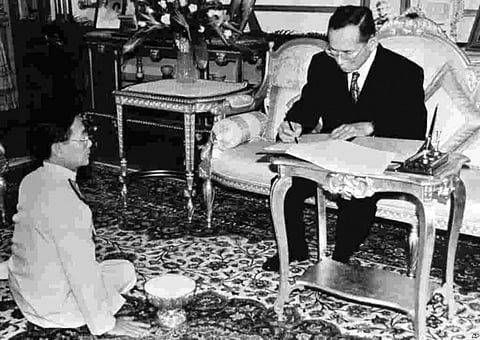October 1,1992: New Thai government sworn in
Constitutional monarch King Bhumibol Adulyadej swore in the ministers at Taksin Palace in Narathiwat

1992 - Prime Minister Chuan Leekpai and his 48-man cabinet took their oaths of office in a ceremony that restored fully-elected democracy to Thailand after 19 months of turmoil. Constitutional monarch King Bhumibol Adulyadej swore in the ministers at Taksin Palace in Narathiwat. They were shown on national television, standing stiffly before him in ranks, in their crisp, white dress uniforms, as they repeated the oath in unison. The brief ceremony completed a process that began with the general election, which gave four pro-democracy parties a razor thin mandate to form a government. They brought a fifth party into the coalition to ensure stability in the 360-member House of Representatives. Thailand’s system of parliamentary democracy was interrupted when the military seized power in a bloodless coup, toppling elected Prime Minister Chatichai Choonhavan. The ruling junta appointed an interim administration led by former diplomat Anand Panyarachun, rewrote the constitution to give it what many called “remote control” of the government.
1800 - Spain cedes Louisiana to France in a secret treaty.
1838 - The first Anglo-Afghan War begins
1890 - Yoshemite National Park is established in California.
1927 - Russian-Persian nonaggression pact is signed.
1940 - America’s first toll superhighway, the Pennsylvania Turnpike, opens to traffic.
1963 - Nigeria becomes republic within the Commonwealth.
1964 - Japan’s Shinkansen (bullet trains) begin high-speed rail service from Tokyo to Osaka.
1970 - Egypt’s Vice-President, Anwar Sadat, succeeds the late Jamal Abdul Nasser as president.
1971 - Walt Disney World opens in Orlando, Florida.
1980 - Warsaw court gives legal approval to Poland’s first six independent trade unions.
1985 - Israel bombs the Palestinian Liberation Organisation headquarters in Tunisia, killing 73 people.
1986 - Former US president Jimmy Carter’s presidential library and museum is dedicated in Atlanta.
1988 - Mikhail Gorbachev becomes President of the Soviet Union.
1990 - Minority Serbs in Croatia proclaim autonomy.
1991 - The US and France cut off millions of dollars in aid to Haiti after a military coup.
1992 - Vice-President Itamar Franco takes over from Brazil’s impeached President Fernando Collor de Mello.
1996 - The UN Security Council lifts sanctions against Yugoslavia in recognition of Serbia’s role in helping bring peace to Bosnia.
1997 - The founder of Hamas, Shaikh Ahmad Yassin, is released from Israel’s Ayalon prison and flown to Amman, Jordan.
1998 - Europol, Europe’s cross-border police force, officially begins operation.
2002 - Two navy transport planes collide over in western India and crashes in a ball of fire, killing all 12 crewmen and three people on the ground.
2005 - Twin bombings rip through restaurants in Bali, Indonesia, killing at least 22 people.
2007 - A volcano erupts on Jabal Al Tair, a tiny Yemeni island in the Red Sea.
2008 - US Congress approves a landmark nuclear energy deal with India.
2012 - Two ferries collide near Lamma Island in Hong Kong, killing 37 people.
2013 - American spy and military thriller best-seller author Tom Clancy died at the age of 66.
2014 - At least 41 Syrian children aged under 12 are killed in a double bombing at a school in Homs.
2015 - College shooting kills 10 people and seven wounded at Umpqua Community College, Oregon.



